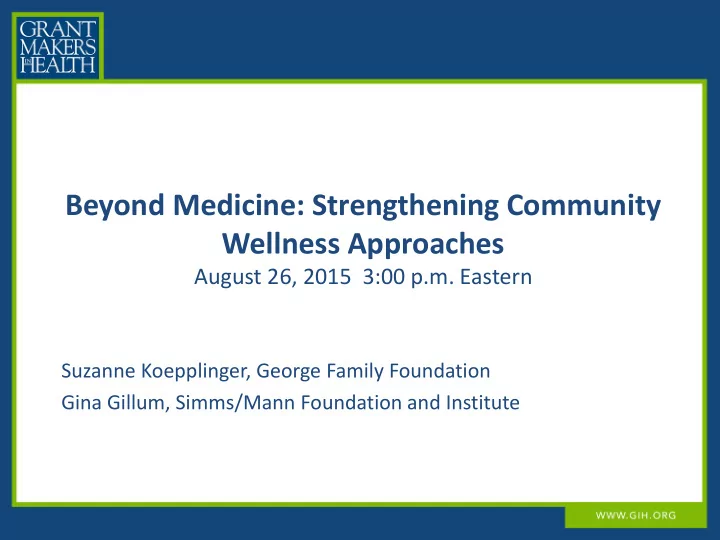

Beyond Medicine: Strengthening Community Wellness Approaches August 26, 2015 3:00 p.m. Eastern Suzanne Koepplinger, George Family Foundation Gina Gillum, Simms/Mann Foundation and Institute
Integrative Healing in Community: The Catalyst Initiative Suzanne Koepplinger, Catalyst Initiative Director, George Family Foundation
George Family Foundation Our guiding philosophy is to invest in people, programs and initiatives that further the mission of the George Family Foundation and help build the communities in which we all live.
Catalyst Initiative: Strategies A three year, $3 million initiative to build integrative health and healing in community. 1. Act as network connector. 2. Host strategic convenings to ignite new energy. 3. Stimulate the emergence of grassroots change agents. 4. Prioritize Active Hope strategies. 5. Leverage opportunities for connectivity. 6. Create meaningful entry points to the work. 7. Promote learning loops to accelerate change .
Why Integrative Health? Psychosomatic illnesses have emotional origins that cause physical symptoms. Chronic stress is responsible for 90% of these illnesses. Source: http://www.ncbi.nlm.nih.gov/pmc/articles/PMC282216 5/ In childhood, persistent and intense stress stemming from ACEs actually influences how the brain develops. Toxic stress strengthens connections in the parts of the brain that are associated with fear, arousal, and emotional regulation. This can result in a lifetime of greater susceptibility to physical illness as well as mental health problems. Source: http://www.health.state.mn.us/divs/cfh/program/ace/s tress.cfm
Adverse Childhood Experiences Cause changes in the architecture of the brain that affect everything from physical growth to emotional development to the capacity to make healthy decisions as an adult. It also increases the risk of alcoholism, depression, liver disease, intimate partner violence, STIs, smoking and suicide. (MDH Health Disparities Report, 2013)
Stress Releases cortisol, which is an immune system suppressant and an inflammatory agent.
Cortisol & Inflammation Persistently high levels of cortisol (toxic stress) raise systemic inflammation. Studies show that a tendency toward inflammation can predispose toward PTSD and elevated risk of other diseases (Scientific American Mind, July/August 2015).
Vicarious or Secondary Trauma Vicarious or secondary trauma “is a process by which a professional’s inner experience is negatively transformed through empathic engagement with client’s trauma material” (Killian, K. 2008). It shows up as anxiety, trouble sleeping, difficulty concentrating, anger. It can accumulate over time.
10
What the research tells us “Meditation and mindfulness exercises proved more successful than standard group therapy in treating symptoms of post-traumatic stress disorder (PTSD) in veterans at the Minneapolis VA Medical Center. Two months after a 9-week course on stress reduction using mindfulness techniques, veterans showed more rapid decline in the severity of their PTSD symptoms than a comparison group. Nearly half receiving the mindfulness training showed clinically significant reductions in their disorders, compared with 28 percent of the comparison group who received standard group therapy, according to results published in the Journal of the American Medical Association (JAMA )”.
Mind-Body Medicine “ It regards as fundamental an approach that respects and enhances each person ’ s capacity for self-knowledge and self care . ” (NCCAM, 2005)
Bessel van der Kolk “In research supported by the NIH, my colleagues and I have shown that ten weeks of yoga practice markedly reduced the PTSD symptoms of patients who had failed to respond to any medication or to any other treatment”. The Body Keeps the Score: Brain, Mind, and Body in the Healing of Trauma. 2014.
Catalyst’s Approach Training and skill building. Convenings and community meetings to foster smart networks. Small, one-time seed grants focused on community-based organizations. Building communities of practice through multiple touch-points. Developmental Evaluation Design.
Community Partners Minnesota Indian Women’s Resource Center – Elders certified as mind body healers. Centro and curanderismo . Somali community leadership creating an Islamic toolkit for stress management. Women veterans developing capacity for healing.
The Role of Trauma in Health Trauma as an entry point to healing. Outcomes of Trauma convenings. Emerging brain science and the mind/body response.
Evaluation Design Inherently difficult to capture outcomes on complex social innovation with multiple variables. Using narrative and select metrics as benchmarks. What? So what? Now What?
“The intuitive mind is a sacred gift, the rational mind is a faithful servant. We have created a society that honors the servant and has forgotten the gift”. Albert Einstein.
Suzanne Koepplinger George Family Foundation Catalyst Initiative Director 612-377-3302 www.georgefamilyfoundation.org suzanne@georgefamilyfoundation.org/catalyst- initiative 20
Gina Gillum Simms/Mann Foundation and Institute
Question? Please type your question into the Chat Box or press *6 to unmute your phone line and ask a question
Recommend
More recommend